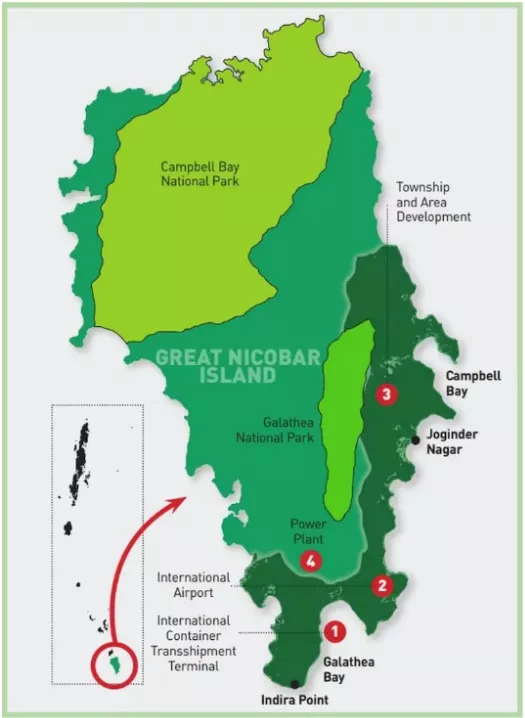India’s mega-development plan for Great Nicobar — a power plant, township, transshipment port, and airport — threatens 13,000 hectares of pristine forest, raising concerns over fragile ecology, tribal rights, and biodiversity, and highlighting the tension between strategic development and environmental protection.
Ecological Significance of Great Nicobar

- Global Biodiversity Hotspot: Andaman and Nicobar Islands act as a major biodiversity hotspot, carbon reservoir, and climate regulator.
- Fragile Ecosystem: Past development has been mainland-driven, often ignoring island-specific ecological needs.
- Strategic vs Environment: Mega-projects like Great Nicobar power plant, township, port, and airport threaten 13,000 hectares of pristine forest, raising concerns about biodiversity, tribal rights, and climate impact.
Tribal Rights and Legal Precedent
- FRA Compliance: Tribal Council certification under the Forest Rights Act (FRA), 2006 must precede forest diversion.
- Niyamgiri Example: 2013 Niyamgiri Hills judgment allowed Gram Sabhas to reject mining projects, safeguarding tribal culture and community resources.
- Nicobar Concern: Reports suggest the Tribal Council was not consulted before approving forest diversion for the project.
Rights of Nature
- Global Models: Countries like Bolivia, Colombia, Ecuador, and New Zealand recognize natural entities as legal persons, with guardians to enforce ecological protection.
- Bio-Cultural Protection: Colombia’s Atrato River case (2016) created a guardianship commission including indigenous representation to protect ecosystems and cultural rights.
- Indian Innovation: Uttarakhand High Court (2017) granted legal personhood to Ganga and Yamuna rivers via designated guardians.
Significance of Legal Personhood
- Ecological Safeguard: Assigning legal personhood to forests and ecosystems provides institutional mechanisms for protection, restoration, and management.
- FRA Integration: Combines tribal autonomy with environmental protection, ensuring projects do not destroy critical habitats.
- Guardianship Role: Enables appointed bodies to sue on behalf of ecosystems and enforce bio-cultural stewardship.
Way Forward
- FRA Enforcement: Ensure tribal consent and active participation in forest management decisions.
- Guardianship Models: Implement nature guardians inspired by Uttarakhand rivers and Atrato River case.
- Impact Assessment: Conduct robust environmental and seismic risk studies before project approval.
- Legal Clarity: Define rights, responsibilities, and enforcement mechanisms for natural entities to promote sustainable development.
Conclusion
Great Nicobar represents the intersection of strategic development, tribal rights, and ecological conservation. Leveraging tribal autonomy and rights of nature can safeguard fragile ecosystems, ensure sustainable infrastructure, and preserve the cultural and environmental integrity of the islands.
![]() 13 Oct 2025
13 Oct 2025


